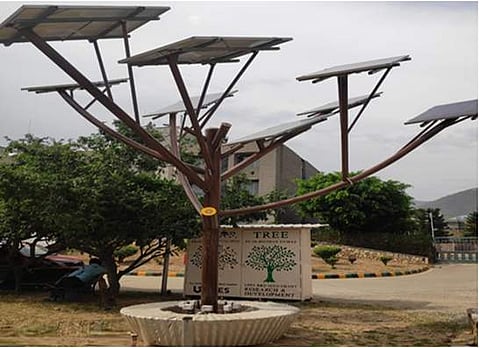

The world is moving towards renewable resources for its fuel needs. We have everything from electric bikes to electric cars but the one problem the owners face in general is that there are not many charging ports available on Indian roads.
The researchers and students of the University of Petroleum and Energy Studies (UPES) have a solution. They developed a Solar Tree that can be installed by the roadside and can not only work as a charger point for your vehicle but for also will also charge your other electronic devices along with providing shade during the day and light at night.
The solar photovoltaic cell is nothing new to us but the Solar Tree not only makes the energy accessible to the public very easily. It also adds aesthetic value, but that is also its USP, said Udayveer Mittal, a student of BTech Mechatronics Engineering. The tree has a 3 watt and a 6 watt LED light, multiple USB 2.0 port and basic electrical sockets to charge laptops as well as mobile phones along with electric vehicles. "The Solar Tree consumes less space as it has the solar panels stacked vertically. This lets it provide some shade as well. It has maintenance free equipment as well," said Udayveer.
The tree is a standalone system that stores the energy in the monocrystalline cell or set of batteries and then uses it for other uses. "The students have developed everything from the circuits to the most of the components," said Dr Roushan Kumar, Department of Mechanical Engineering. "This is the state of the art installation built by the students of various departments from scratch. We have applied to the DST for funding the project as well," said Dr Kumar.
The students have also developed an electric cycle with pedal assist sensors, charging ports and electronic locking. "The bike can run at a speed of around 30 kmph and can go 60 km in one charge on hilly terrain and around 75 km on plain land," said Dr Kumar. The cycle will cost you around Rs 20,000 but a major chunk of it is the cost of the bicycle itself.
